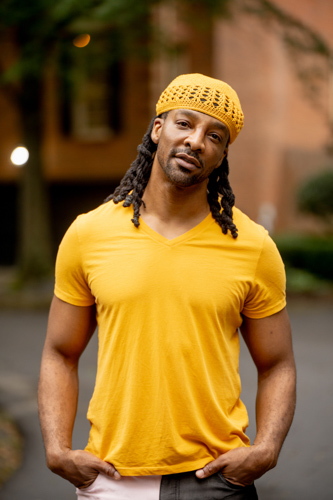About Jericho's Work
Jericho Brown is a poet reflecting on contemporary culture and identity in works that combine formal experimentation and intense self-examination. He reimagines well-known poetic forms and rhythmic structures in ways that heighten a poem’s emotional charge. Across three collections, Brown explores themes of masculinity, spirituality, family, sexuality, and racial identity from a personal perspective as well as from feelings inspired by pop culture and contemporary America.
In his first collection, Please (2008), Brown incorporates influences from popular music, such as replicating syncopation of classic rhythm and blues, as he describes the sometimes blurred boundary between intimacy and violence. Brown’s second book, The New Testament (2014), draws connections between individual suffering and broader injustices such as the HIV/AIDS crisis, mass incarceration, and community trauma. In several poems, Brown reworks biblical passages to emphasize the isolation and oppression that many experience in America. Brown’s calibration of form, tone, and language is even more fully realized in The Tradition (2019). He introduces a form of his own invention—the duplex (or gutted sonnet)—that is a fusion of the traditional sonnet, the Arabic ghazal, and the ironic holler of American blues. It is comprised of 14 lines of 7 couplets, with the first line of each couplet echoing the second line of the previous one, and the last line echoing the poem’s first. The circular repetition lends itself to shifts between dissonant voices or images; for example, in one duplex the speaker’s train of thought moves from a first love, to his abusive father, to his grieving mother. In other variations on the sonnet form, shifting perspectives bring the reader face-to-face with violence inflicted on Black lives. The title poem in The Tradition begins like a pastoral lyric, with a list of flower names: “Aster. Nasturtium. Delphinium.” Brown deftly touches on the evolution of Black life in America in relation to the land—sharecropping and climate change—before pulling the reader firmly into the present moment with a lament for lives cut short at the hands of police: “John Crawford. Eric Garner. Mike Brown.”
Brown writes with frankness and vulnerability about love, both filial and erotic. He explores the complexities of his identity as a Black gay man and expresses tenderness and devotion toward his mother and other Black women. In poems with astonishing lyrical beauty, Brown illuminates the experiences of marginalized people and shows the relevance and value of formal experimentation.












